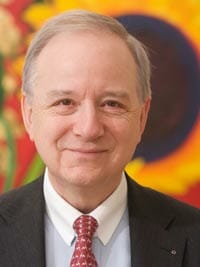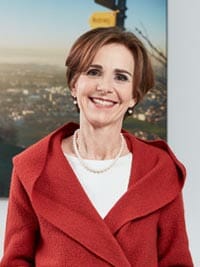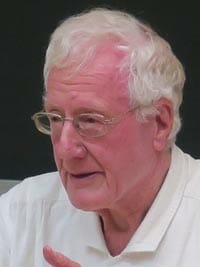RealUnit Schweiz (CHF): A description of our concept when we re-established our former fund.
In their book “The RealUnit. Zur Quelle der Geldwertstabilität” nine years ago, Karl and Remy Reichmuth sought a solution to the biggest problem of our monetary order. They developed an investment vehicle designed to protect savers from devaluation by letting them participate in economic growth. With the RealUnit, they invented a currency that is once again backed by real assets – no longer by gold, but by economic output.
For seven years, Karl Reichmuth invested one million francs according to this concept – with better returns than that of all savings accounts and almost all strategy funds. Now, Karl and Remy Reichmuth want to get pensioners to join their investment vehicle with a broadly diversified, liquid fund.
Karl Reichmuth, you have been working with money for half a century, but you don’t really trust it. Could it be that you are in the wrong business?
KR: On the contrary. I strive to build the trust on which my business is based. That is precisely why I am concerned with the public distrust of money; it is a distrust that I myself have inherited.
From whom?
KR: My father, a master cheese maker and pig farmer, who’d been around long enough to see the Latin Monetary Union. Around 1900, he could measure out four liters of milk each for one Swiss franc, one French franc or one Italian lira. When I first managed the branch of the Kreditanstalt in Schwyz in 1970, I calculated the depreciation of money. At that time, not a drop of milk could be bought for a lira; the Italians had already deleted three zeros from the lira. The experiences of the 20th century must make everyone doubt money.
Remy Reichmuth, you also studied financial market theory in economics degree and financial analyst training. Do you see your father’s attitude as a quirk?
RR: When he first brought me in to work together on a book about monetary stability in 2001, I actually had a hard time following his thinking. But by now, this topic is also my hobby and also my profession; after all, as a banker, I have to deal with these issues on a daily basis.
Why?
RR: The money that the state issues is a wonderful invention, but only for exchanging for goods, not for preserving value. It is the store-of-value function of money that we distrust. When we see that states want to solve the problem of over-indebtedness with more debt, serious questions do arise. Euroland was 30 percent in debt as a percentage of GDP in 1980; now it is 85 percent, and the implicit debt due to promised pension and health care benefits is several hundred percent in most countries. Do you want to continue entrusting your savings to such states?
What do you have against the money guaranteed by the state?
RR: It can be abused. From the Chinese, who invented paper money in the 12th century, to the Americans, who were forbidden by Roosevelt in 1933 to hold gold privately so that the dollar could depreciate unnoticed. This was particularly drastic in 1922 after the Greek-Turkish War. In heavily over-indebted Greece, people had to cut the banknotes in two: with one half they could continue to barter, with the other they had to subscribe to government bonds.
KR: This abuse was recognized by the economist Friedrich August von Hayek. In a 1976 paper, he therefore called for the denationalization of money.
You invoke the great thinker when you speak of privatizing money. What is private money supposed to be?
KR: I also learned that in a very tangible way from my father. When he handed over the cheese dairy to my brother, in order to cover his need for francs in the barter economy, he demanded as payment a monthly annuity equivalent to the value of a sow; he thus always received the price of 130 kilos of meat, regardless of the devaluation of money. The lesson is: it’s all about thinking in terms of real value. My father as a pig farmer thought in terms of sows, we as bankers think in terms of gross domestic product.
Isn’t this pig-farming anecdote pure nostalgia for a young banker of today?
RR: No, not at all. It’s not about nostalgia, it’s about an acute problem. How can savers and pensioners retain the value of their assets? In the last fifty years, the dollar lost 86 percent of its purchasing power – as a world currency! And the next crisis is imminent. We do not expect it to happen because of a stock or real estate bubble, but because of government debt. As a result of the over-indebtedness of many countries, there is a threat of strong inflation, not so much in consumer goods, which we still get cheaply from the emerging markets, but in assets, which are getting more expensive because of the money glut. Those who only own nominal assets, i.e. savings or bonds, suffer severely from this kind of nflation because they fall further and further behind in comparison. We want to protect savers from this by giving them a stake in real assets.
But globalization owes its triumph to the detachment of money from real goods since the Americans abandoned the dollar’s peg to gold in 1971.
KR: Globalization prevailed mainly thanks to innovations in logistics and information technology. Of course, the cheap money available due to the loose policies of central banks boosted growth around the world. But the money glut mainly caused the financial world to take off. In recent decades, the financial industry and the real economy have drifted apart alarmingly, because it was so easy to make much more money with money.
RR: Even the imbalances between China and the U.S., i.e. the balance sheet deficits of the over-indebted Americans that ultimately plunged the world into crisis, could never have happened if the trillions of dollars had been linked to real assets. Of course, trade flourished thanks to this monetary system. But it’s not sustainable, as we’re seeing now.
Then you think – like the Chinese – that the world should move away from the dollar and adopt an independent currency based on the gold standard or the International Monetary Fund’s Special Drawing Rights?
RR: Absolutely – now we have a completely unbacked monetary system. However, SDRs are questionable for the same reasons as national currencies, and a return to the gold standard is also problematic, as the amount of gold available does not grow as fast as the economy. But information technology today enables us to get back the store of value function of money – as I said, not with sows, but with economic performance. In this way, we can move away from a credit-based monetary order to a performance-based one.
Do you also distrust the Swiss franc? The National Bank is doing a good job after all.
KR: That is indeed the case. Actually, we should first introduce our investment instrument in all euro countries, where these problems are much more urgent. The RealUnit would be a good solution for Germany or Greece, where there is a threat of strong inflation, or even for Argentina and its shattered currency. We want to take it abroad as well. The RealUnit fund is not the extreme portfolio with which we could prepare for strong inflation; but it does protect us from it better than a savings account. Our goal is to preserve value in both inflationary and deflationary times. That’s where the RealUnit also comes in handy in Switzerland. We expect to cannot remain an island during the turbulence that is looming.
Why?
KR: Switzerland also had to devalue the franc in 1936, as the last country to do so, because it would otherwise not have been able to compete internationally after the competitive devaluations of the other countries. After all, it is typical that we in Switzerland think about such things. We always come up against many limits in our small country. I had to learn to think in other currencies when I went on my first bicycle tour to Genoa in 1958. In the larger countries, people can feel like they are in the Catholic Church: this is my faith – I know nothing else. For the Swiss, home always includes a piece of a foreign country; therefore, the RealUnit also contains international investments.
In the private bank, you advise wealthy clients who can help themselves.
RR: Yes, they are already thinking in terms of individual currencies, putting together their own asset allocation based on their needs.
So why do you care about the small savers?
KR: My ten years at Luzerner Kantonalbank simply showed me that even in stable Switzerland, small savers cannot maintain the value of their savings and pension assets with savings accounts or medium-term bonds. I always felt that was one of the biggest problems in our country.
And why are you the only one doing something about it?
KR: The banks that offer savings accounts or funds also profit from the current monetary system.
But what about the RealUnit’s profitability?
RR: It is only in the introductory phase that the calculation might not add up. For an average strategy fund, expenses are 1.8 percent, which eats away part of the performace. By contrast, since we manage the fund assets passively with exchange-traded funds, we expect total costs of 0.9 percent. For small volumes, they tend to be higher. But we are aiming for at least 100 million Swiss francs, so we can even reduce costs further and still be in the black.
But even then, it’s still not a good deal. Then why do you do it?
RR: In our private bank, we want to identify customer needs and understand the financial markets: People and money in harmony. Now we see the needs of savers and pensioners, because there are serious problems due to unsustainable sovereign debt: we would like to satisfy these needs as well with our approach. With the RealUnit fund, we are creating a store of value solution not on an individual basis, but on a standardized basis for the general population.
KR: I am convinced that the capitalist system, to which we owe our prosperity, can only be saved if we solve this problem. That’s why I want to work for savers in this stage of my life.
The Swiss are already saving enough.
KR: Maybe it is enough, but it is saved in the wrong way. At some point they’ll experience disappointment because the state cannot keep its promises.
RR: Our goal is not to encourage saving – but to provide sensible, value-preserving investments for those who want to save.
You talked to a lot of people in the last six months as you were preparing to launch the RealUnit. What kind of response did you get?
RR: Finma showed interest, and they also had our book from 2001 sent to them. Same with the major banks that we considered as custodian banks. However, they did find it suprising that we did not pay retrocessions to advisors to sell our products.
. That seems to be how it usually works.
How are you going to get the RealUnit to the people if the banks don’t act as intermediaries?
KR: By driving from town to town in a delivery truck like Gottlieb Duttweiler once did. Seriously though, if our idea is as good as we think it is, it will take on bigger dimensions. So, like Migros, we set up a business with the lowest margins. The process is simple, an order at any bank is enough.
RR: We hope to get people’s attention. Conversations with friends show me that we really hit a nerve. You can also see this from the fact that Germans just identified their exorbitant national debt as their biggest concern in a recent survey. This issue will stay with us for years to come.
KR: And as we know, nothing is as powerful as an idea whose time has come.
Published in: No.975 January/February 2010 Swiss Monthly Bulletin
Karl Reichmuth, born in 1939, worked as a banker at Schweizerische Kreditanstalt and Luzerner Kantonalbank. In 1995 he founded Reichmuth & Co. Privatbankiers in Lucerne as a partner with unlimited liability.
Remy Reichmuth, born in 1976, studied business administration at the University of Zurich and worked for various banks in Switzerland and China before joining Reichmuth & Co. Privatbankiers in 2008.
Markus Schär, born in 1956, is a journalist and external project partner of Avenir Suisse.
Photo: fotoart111/AdobeStock.com









